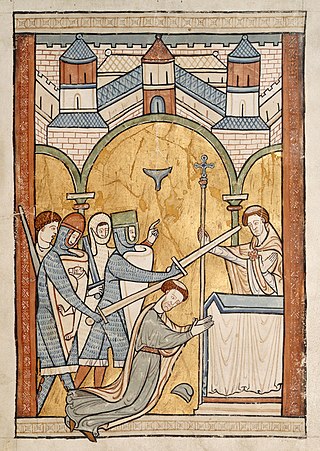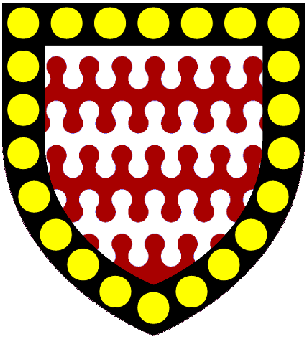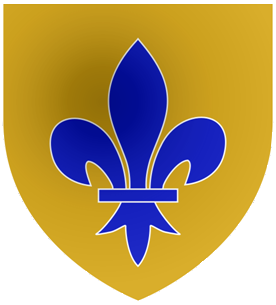Related Research Articles

William Fitzstephen, was a cleric and administrator in the service of Thomas Becket. In the 1170s he wrote a long biography of Thomas Becket – the Vita Sancti Thomae.

Sir William de Shareshull KB (1289/1290–1370) was an English lawyer and Chief Justice of the King's Bench from 26 October 1350 to 5 July 1361. He achieved prominence under the administration of Edward III of England.
Hervey de Stanton was an English judge and Chancellor of the Exchequer.

Sir William Portman was an English judge, politician and Chief Justice of the King's Bench. He was MP for Taunton in 1529 and 1536.

Sir Henry Redford or Retford was a Knight of the Shire, Sheriff of Lincolnshire and the Speaker of the House of Commons.
Robert III de Stuteville was an English baron and justiciar.

Sir Richard Aston was an English judge who served as King's Counsel and Lord Chief Justice of the Court of Common Pleas in Ireland. Aston worked to reform law practice, specifically to change the process in which bills of indictment were issued without the examination of witnesses. After leaving his post in Ireland, he joined Lord Mansfield's court.
Sir William Henry Ashurst (1725–1807) was an English judge.
John Bacon was an English judge.
Sir Robert Baldock, was an English judge.

John de Bourchier was an English Judge of the Common Pleas and the earliest ancestor, about whose life substantial details are known, of the noble and prolific Bourchier family, which in its various branches later held the titles Barons Bourchier, Counts of Eu, Viscounts Bourchier, Earls of Essex, Barons Berners, Barons FitzWarin and Earls of Bath.
Sir Stephen Rice (1637–1715) was Chief Baron of the Exchequer in Ireland and a notable supporter of James II.
Richard of Barking was an English Benedictine, the Abbot of Westminster, and a leading judge.
Hugh de Bocland or Hugh of Buckland, was sheriff of Berkshire and several other counties.
Henry de Hambury, was an English judge who held high judicial office in Ireland, being briefly Lord Chief Justice of Ireland.
Sir William Shelley (1480?–1549) was an English judge.
Michael Belet was an English judge, sheriff of Worcestershire 1176-81 and again in 1184, of Wiltshire 1180-82, of Leicestershire and Warwickshire in conjunction with Ralph Glanvill 1185-87, and alone 1189-00. He appears as a justice itinerant for Warwickshire and Leicestershire in 1177, in the following year for Lincolnshire, and in 1179, on the redistribution of circuits which then took place, he was assigned for the eastern circuit.
Ralph de Bereford was an English judge, of a legal family possessing large estates in the midland counties.
William Bendings was an English judge and county sheriff.
Hugh de Cressy was an Anglo-Norman administrator and nobleman. Little is known of his ancestry and he first served two brothers of King Henry II of England before becoming a royal official. He was rewarded with a marriage to an heiress for his service to the king. In England he often served as a royal justice and witnessed documents, which showed his closeness to the king. On the continent, he recruited mercenaries for the royal army and was named constable of the castle of Rouen in the royal lands in France. He died in 1189 after giving lands to various monasteries before his death.
References
. Dictionary of National Biography . London: Smith, Elder & Co. 1885–1900.
- Attribution
![]() This article incorporates text from a publication now in the public domain : "Banastre, Alard". Dictionary of National Biography . London: Smith, Elder & Co. 1885–1900.
This article incorporates text from a publication now in the public domain : "Banastre, Alard". Dictionary of National Biography . London: Smith, Elder & Co. 1885–1900.
This article relies largely or entirely on a single source .(January 2011) |